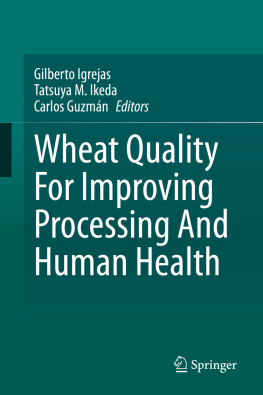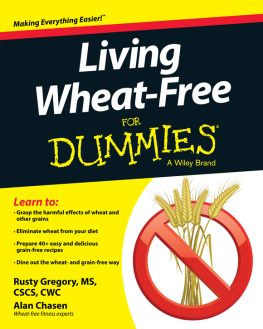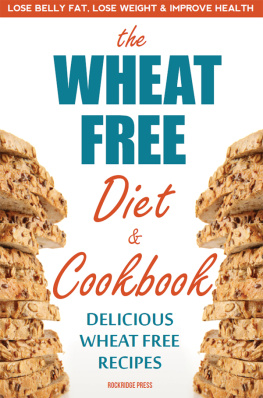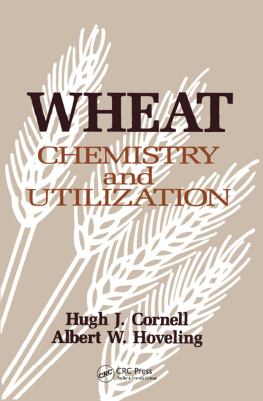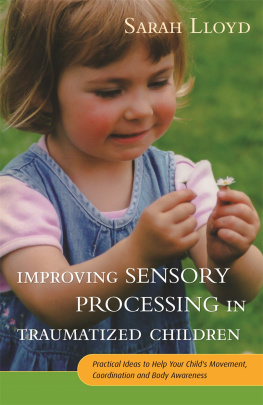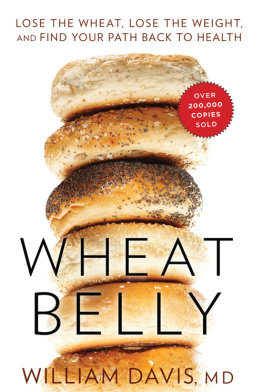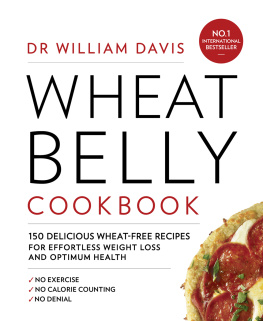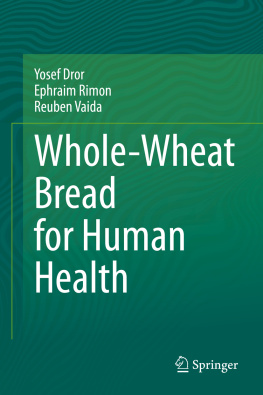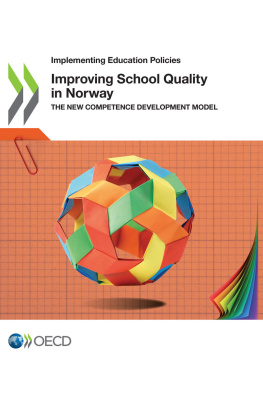Gilberto Igrejas - Wheat Quality For Improving Processing And Human Health
Here you can read online Gilberto Igrejas - Wheat Quality For Improving Processing And Human Health full text of the book (entire story) in english for free. Download pdf and epub, get meaning, cover and reviews about this ebook. year: 2020, publisher: Springer International Publishing, genre: Romance novel. Description of the work, (preface) as well as reviews are available. Best literature library LitArk.com created for fans of good reading and offers a wide selection of genres:
Romance novel
Science fiction
Adventure
Detective
Science
History
Home and family
Prose
Art
Politics
Computer
Non-fiction
Religion
Business
Children
Humor
Choose a favorite category and find really read worthwhile books. Enjoy immersion in the world of imagination, feel the emotions of the characters or learn something new for yourself, make an fascinating discovery.
- Book:Wheat Quality For Improving Processing And Human Health
- Author:
- Publisher:Springer International Publishing
- Genre:
- Year:2020
- Rating:4 / 5
- Favourites:Add to favourites
- Your mark:
- 80
- 1
- 2
- 3
- 4
- 5
Wheat Quality For Improving Processing And Human Health: summary, description and annotation
We offer to read an annotation, description, summary or preface (depends on what the author of the book "Wheat Quality For Improving Processing And Human Health" wrote himself). If you haven't found the necessary information about the book — write in the comments, we will try to find it.
Wheat Quality For Improving Processing And Human Health — read online for free the complete book (whole text) full work
Below is the text of the book, divided by pages. System saving the place of the last page read, allows you to conveniently read the book "Wheat Quality For Improving Processing And Human Health" online for free, without having to search again every time where you left off. Put a bookmark, and you can go to the page where you finished reading at any time.
Font size:
Interval:
Bookmark:
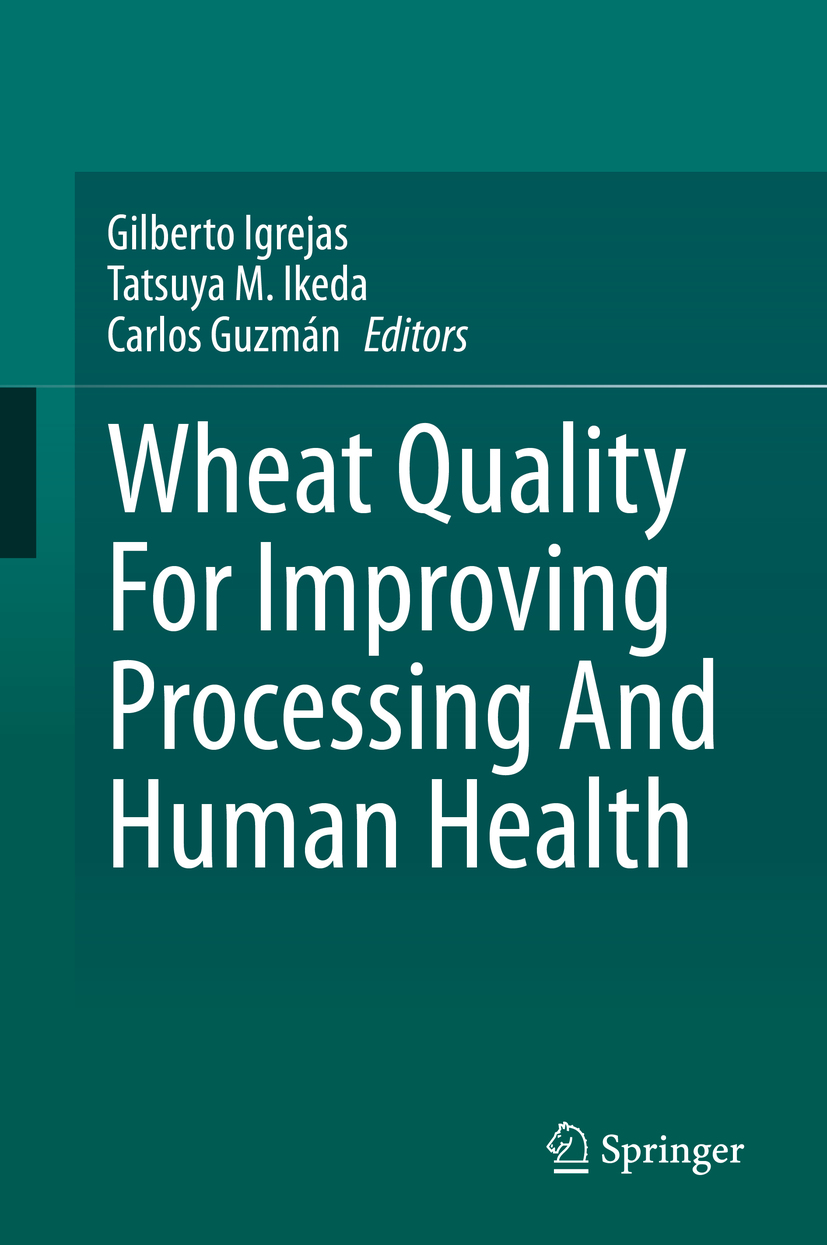

This Springer imprint is published by the registered company Springer Nature Switzerland AG
The registered company address is: Gewerbestrasse 11, 6330 Cham, Switzerland
Wheat is one of the most consumed, produced and stored food crops worldwide. The paramount importance of wheat to human populations can be attributed to the remarkable work done by wheat breeders, who have improved wheat varieties keeping them in the spotlight of global agriculture. The recently completed annotation of the entire genome of bread wheat ended 13 years of collective effort to crack the wheat genetic code. The genome sequence can be used to study gene expression at any point in the life cycle of the plant, and to define which genes to target to improve yield and stress resistance. This massive advance not only allowed better understanding of relevant genes for agricultural applications but also for end-use quality traits.
During the last four years, wheat quality scientists from different countries have worked to develop the Expert Working Group (EWG) on Improving Wheat Quality for Processing and Health under the Wheat Initiative umbrella. This joint effort provides a framework to establish strategic research and organisation priorities for wheat improvement at the international level in both developed and developing countries. This EWG aims to maintain and improve wheat quality for processing and health under varying environmental conditions. The EWG has been focused on wheat quality in the broad sense, including seed proteins, carbohydrates, nutritional quality, grain processing and food safety. Bioactive compounds are also being considered, both those with negative effects, such as allergens and mycotoxins, that cause serious problems that need to be resolved, and those with positive effects, such as antioxidants or fibers, that can potentially be exploited. The EWG also works in the development of germplasm sets and other tools that can be deployed in wheat quality research.
The preparation of this book covering the whole range of grain quality topics is one of the important activities that the EWG is doing nowadays. The book should serve to identify possible gaps in important areas of wheat quality research and to position the EWG as an initial point of reference for the global wheat community regarding the different topics covered in depth here. Forty EWG members worked on 21 chapters of the book. This book adheres to the same policies that the EWG promotes such as using unified nomenclature to name the different alleles and providing correct information about materials (accession name, Germplasm Bank of origin, etc.) so other researchers know exactly what is being described and how to obtain the same materials or information.
1.The importance of wheat
2.Wheat gluten protein structure and function: is there anything new under the sun?
3.Starch and starch-associated proteins: impacts on wheat grain quality
4.Contribution of genetic resources to grain storage protein composition and wheat quality
5.Durum wheat storage protein composition and the role of LMW-GS in quality
6.Gluten analysis
7.Proteomics as a tool in gluten protein research
8.Genotypic and environmental effects on wheat technological and nutritional quality
9.Improving wheat nutritional quality through biofortification
10.Phenolic compounds in wheat kernels: genetic and genomic studies of biosynthesis and regulations
11.Wheat cell wall polysaccharides (Dietary Fibre)
12.Grain quality in breeding
13.High throughput testing of key wheat quality traits in hard red spring wheat breeding programs
14.Molecular marker development and application for improving qualities in bread wheat
15.Durum wheat products, couscous
16.Understanding the mechanics of wheat grain fractionation and the impact of puroindolines on milling and product quality
17.The impact of processing on potentially beneficial wheat grain components for human health
18.Fusariumspecies infection in wheat: impact on quality and mycotoxin accumulation
19.Effects of environmental changes on the allergen content of wheat grain
20.Health hazards associated with wheat and gluten consumption in susceptible individuals and status of research on dietary therapies
21.FODMAPs in wheat
22.Epilogue: The main activities of the International collaboration on wheat quality and safety
Font size:
Interval:
Bookmark:
Similar books «Wheat Quality For Improving Processing And Human Health»
Look at similar books to Wheat Quality For Improving Processing And Human Health. We have selected literature similar in name and meaning in the hope of providing readers with more options to find new, interesting, not yet read works.
Discussion, reviews of the book Wheat Quality For Improving Processing And Human Health and just readers' own opinions. Leave your comments, write what you think about the work, its meaning or the main characters. Specify what exactly you liked and what you didn't like, and why you think so.

